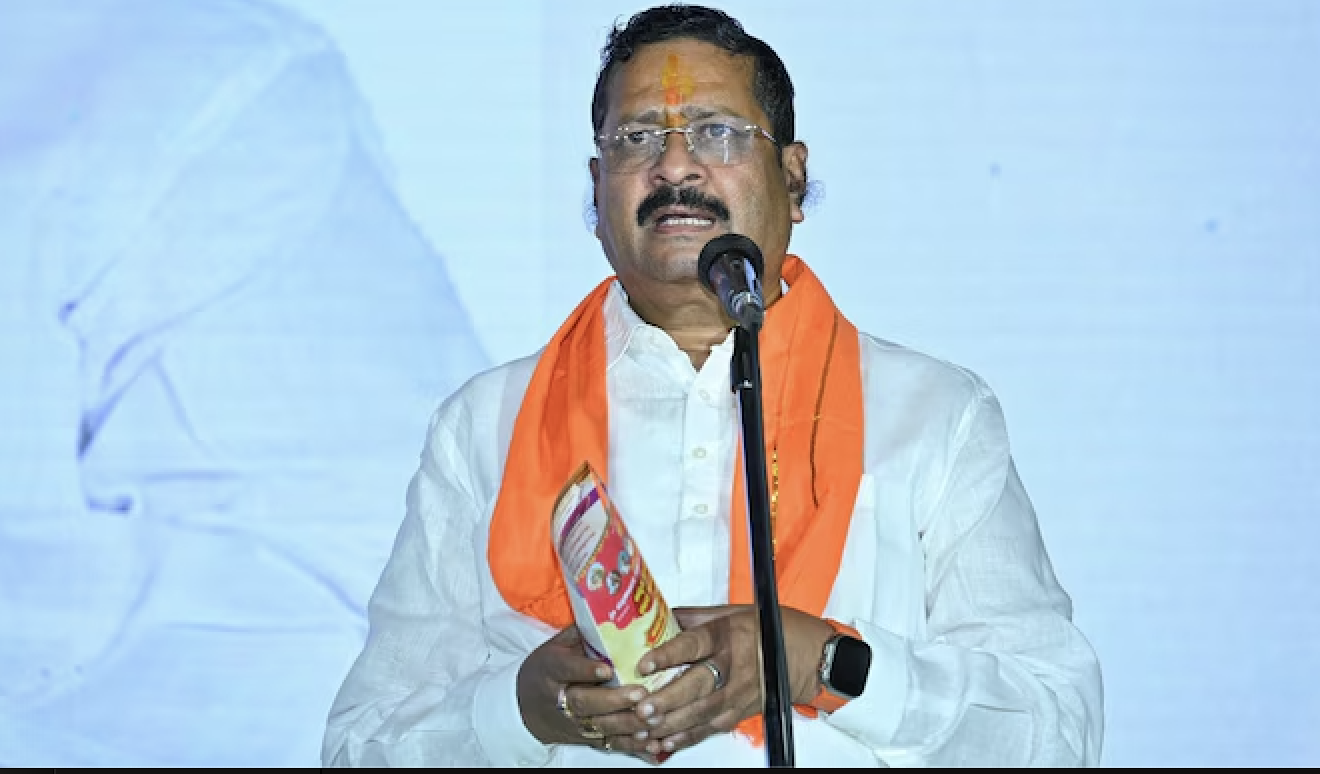
By Syed Khalique Ahmed / India Tomorrow
NEW DELHI—Are Gujarat government’s plans to teach Bhagavad Gita in schools from Std six to 12 from the next academic session based on the recommendations of various education commissions and committees set up by the union ministry of education?
A study of the reports and recommendations of various panels after Independence shows that none of the panels ever recommended teaching religious scriptures of only one community or moral values, ethical codes, and spirituality based on the sacred scriptures of the majority community.
But the Gujarat government made a statement in the state assembly to teach Gita to students in schools. The government notification has not mentioned if schools will teach moral values and ethical codes based on scriptures of religions followed by other religious communities also.
While making an announcement to this effect in the state assembly, State Education Minister Jitu Vaghani said that schools in the state would teach “values and principles contained in the Bhagavad Gita as part of the integration of Indian culture and Indian knowledge system.”
The minister tried to justify the move by connecting it with National Education Policy-2020.
The circular issued by the state government says NEP-2020 “emphasizes to instill in students a sense of pride and connection to India’s rich, diverse, ancient and modern culture and systems of knowledge and traditions.”
“This is essential for the students of the state schools to be acquainted with the glorious heritage of Indian culture and to be proud of being Indian so that Indian culture is integrated with the daily life and school experiences of the students,” says the circular issued by the state education department.
The circular says that it will be introduced in government-run schools. However, at the same time, it says that it will not be optional and evaluated. It means all the students will have to study it because it will be part of the examination. And if it is evaluated, then even the private-run schools will have to teach it.
However, the teaching of the Gita will not be a separate subject. Topics on Gita will be incorporated in Gujarati language books from Std 6 to Std 12. This will ensure that every student, irrespective of his faith, will have to study it.
According to experts of the Hindu religion, alongside Ramayan, Bhagavad Gita is “a synthesis and compendium of Hindu spiritual ideas on Dharma, Bhakti, Karma, Moksha, Raja Yoga, etc.”
So, Bhagavad Gita is a religious book of Hindus, propagating Hindu spiritual ideas. It must be clarified that spirituality and even moral values are not independent of religion. They are derived from religion. So, they are an inalienable part of the religion they are derived from. Hence, the moral values and spirituality derived from one religion will be different from those derived from other religions. This is so because the basic tenets of all the religions are not similar but different. For example, living a life of celibacy for men and women is considered to be the spirituality of a very high level in Hinduism and Catholic Christianity. And celibacy is practiced generally by their priestly people. Against it, Islam rejects celibacy and encourages people to have a married life. Married life is considered superior to celibacy. Moreover, there is also no priestly class in Islam.
There have been debates on religion and education since the British period in India. Various commissions set up by the British government discussed introducing religious education in the school curriculum. Infamous Minutes of Macaulay (1836), Woods Dispatch (1854), and Education Commission (1882) have all discussed religious instruction in education and the inclusion of religion in the curriculum. However, the Britishers, after all these debates, followed a policy of neutrality towards religion in education.
In the context of his Wardha Scheme (1938), Mahatma Gandhi felt that teaching religion in schools could have a dreadful impact. However, he advised imparting common ethics of all faiths in schools. During the constituent assembly debates on religious education in schools, B R Ambedkar had recommended the philosophical study of religions over dogma. Ambedkar warned how teaching the religious texts of the majority religion will exclude other communities’ children.
As current political circumstances have forced different religious communities to live in their separate ghettoes, many do not know the fundamentals of other religions other than their own. It has now bred prejudices against other religions and created social and communal discord. It would have been appropriate if the basic tenets of all religions and the moral and ethical values contained in them were taught in schools. This would have resulted in a better understanding of different religions’ moral and spiritual values and promoted communal harmony and friendship.
Radhakrishnan Commission, the first education commission set up after Independence in 1949, recommended imparting religious education to all religions and introducing prominent religious and cultural personalities of different faiths in the educational curriculum of schools. It also recommended publishing a book on ‘Natural Religion’ based on fundamental teachings of all religions to create a broader understanding of all religions’ religious principles and ethical and moral values. However, it was never implemented.
As religious education issues continued to be debated in academic, intellectual, and political circles, the Union Ministry of Education formed “The Committee on Religious and Moral Education” in 1959. It was also called Sri Prakash Commission because it was headed by Sri Prakash, the then Governor of the Bombay State.
After going into the depth of the issue, the committee advocated ” an objective, comparative and sympathetic study of India’s important religions.” It recommended that moral and spiritual education include “a comparative and sympathetic study of the lives and teachings of great religious leaders and at later stages, their ethical systems and philosophies” from school to university level.
It further said that “by knowing the broad outline of our countrymen in all their variety, we shall add to the fund of our knowledge, and with this knowledge and understanding, ignorance which breeds prejudice and bigotry, will give way to tolerance and sympathetic appreciation of the religious life of our fellow citizens.”
No other commission had gone into so much detail about the importance of religious education in the school curriculum.
The authors of the report pointed out that India needs to adopt a kind of approach in matters of mutual religious understanding as discussed in Maulana Abul Kalam Azad’s commentary on the Quran, titled Tarjuman-ul-Quran and Dr. Bhagwan Das’s The Essential Unity of All Religions. However, these recommendations were never implemented.
Earlier, Mudaliar Commission in 1953 had also recommended imparting religious education after school hours with parents’ consent. Kothari Commission in 1964-66 recommended implementing the recommendations of previous commissions and committees on religious and moral education.
Regarding the Gujarat government’s decision to teach Bhagavad Gita in schools, the Markazi Taleemi Board (MTB) of the Jamaat-e-Islami Hind (JIH) has asked all the state governments to leave religious education(creed and rituals) to home and faith-based schools and, instead focus on modern education. And suppose at all, state governments decided to impart religious education in the name of value education. In that case, they should include “consensual values of all the religions, cultures, denominations and different schools of religious thought in the country.” For example, the poetry of Tituvallur, Vachanas of Basavanna, the Bible, the Quran, Guru Granth Sahib, Vedas, Upanishads, and Bhagavad Gita should be taught with due consent of the parents after school hours. It urged the state governments that the teaching of religious texts should be in line with the ideas of Gandhi and Ambedkar and based on recommendations of famous commissions of post-colonial India.
When questioned about the Gujarat government’s decision, JIH’s media secretary Syed Tanveer Ahmed said, “Teaching of moral and ethical values is welcome. But the government should adopt a holistic approach by including fundamentals of all religions in the educational curriculum, and not that of the religion of one community only because India is a multi-religious and multi-cultural nation. Therefore, students must be taught the basics of all religions to promote understanding of all communities’ moral and ethical values to strengthen communal harmony and national integration.”
Christian leader Fr. Cedric Prakash, commenting on the Gujarat government’s announcement, said that “introducing only the study of the Bhagavad Gita in government schools smacks of majoritarianism and violates the secular fabric of the country.” He asked the Gujarat government to ” reconsider and change this decision immediately.” He suggested introducing a well-planned course with a study of “all major world religions and their holy books including Bible, the Quran, the Guru Granth Sahib, Avesta, the Tripitaka, Agamas, and others.”
This article first appeared on indiatomorrow.net






